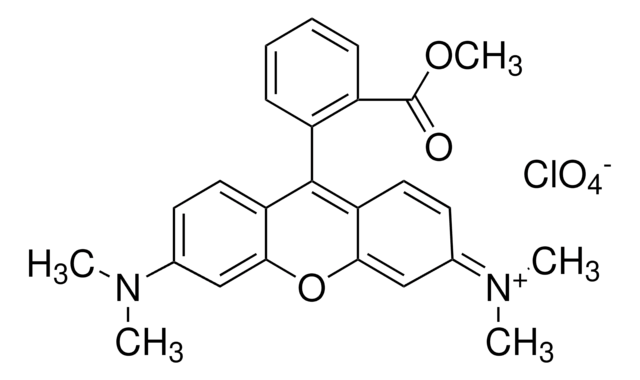D0815
2-[4-(Dimethylamino)styryl]-1-ethylpyridinium iodide
≥99% purity (HPLC), solid
Synonym(s):
DASPEI
About This Item
Recommended Products
Product Name
2-[4-(Dimethylamino)styryl]-1-ethylpyridinium iodide, ≥99% (HPLC), solid
Quality Level
assay
≥99% (HPLC)
form
solid
color
red
mp
267 °C (dec.) (lit.)
solubility
DMSO: 0.5 mg/mL
methanol: soluble
εmax
36.0-41.0 at 457-463 nm in methanol
application(s)
diagnostic assay manufacturing
hematology
histology
storage temp.
2-8°C
SMILES string
[I-].CC[n+]1ccccc1\C=C\c2ccc(cc2)N(C)C
InChI
1S/C17H21N2.HI/c1-4-19-14-6-5-7-17(19)13-10-15-8-11-16(12-9-15)18(2)3;/h5-14H,4H2,1-3H3;1H/q+1;/p-1
InChI key
AMAXNNVXIBDEMV-UHFFFAOYSA-M
Looking for similar products? Visit Product Comparison Guide
Application
Biochem/physiol Actions
Storage Class
11 - Combustible Solids
wgk_germany
WGK 3
flash_point_f
Not applicable
flash_point_c
Not applicable
ppe
dust mask type N95 (US), Eyeshields, Gloves
Choose from one of the most recent versions:
Already Own This Product?
Find documentation for the products that you have recently purchased in the Document Library.
Our team of scientists has experience in all areas of research including Life Science, Material Science, Chemical Synthesis, Chromatography, Analytical and many others.
Contact Technical Service
![trans-4-[4-(Dimethylamino)styryl]-1-methylpyridinium iodide Dye content 98 %](/deepweb/assets/sigmaaldrich/product/structures/416/722/5d59b6c3-5f2d-4396-a721-5cb82ba7038c/640/5d59b6c3-5f2d-4396-a721-5cb82ba7038c.png)
![4-[4-(Dimethylamino)styryl]pyridine 95%](/deepweb/assets/sigmaaldrich/product/structures/225/605/ad18cc93-9d43-467b-8618-105948f9692b/640/ad18cc93-9d43-467b-8618-105948f9692b.png)
![2-[4-(Dimethylamino)styryl]-N-methylbenzoxazolium perchlorate 99% (TLC)](/deepweb/assets/sigmaaldrich/product/structures/917/393/44ab3489-e929-4608-9398-791a2508734b/640/44ab3489-e929-4608-9398-791a2508734b.png)
![TRANS-4-[4-(DIBUTYLAMINO)STYRYL]-1-METHYLPYRIDINIUM IODIDE AldrichCPR](/deepweb/assets/sigmaaldrich/product/structures/316/860/49e4e927-ce25-4d51-b402-f30f828fdd24/640/49e4e927-ce25-4d51-b402-f30f828fdd24.png)




